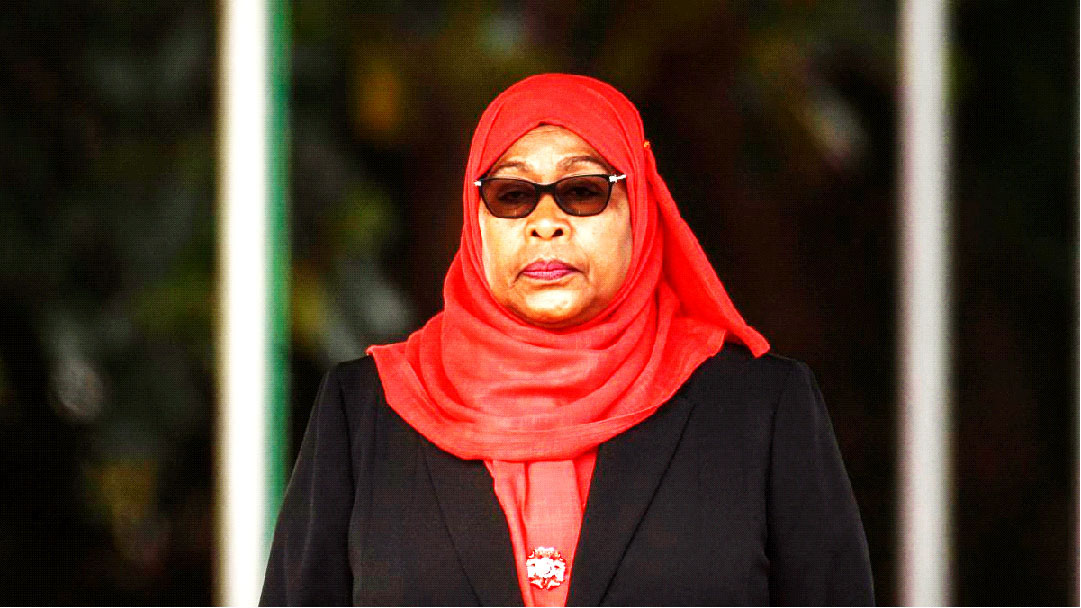NAIROBI, (Reuters) – Tanzania’s new President Samia Suluhu Hassan said yesterday the country should unite and avoid pointing fingers after the death of John Magufuli, her COVID-19 sceptic predecessor, urging the east African country to look forward with hope and confidence.
Wearing a red hijab, she took her oath of office on the Koran in a ceremony at State House in the commercial capital Dar es Salaam. She is the first female head of state in the country of 58 million.
Vice president since 2015, Hassan gave a brief and sombre address after she was sworn in, addressing a heavily male crowd that included two former presidents and uniformed officers.
“This is a time to bury our differences, and be one as a nation,” she said. “This is not a time for finger pointing, but it is a time to hold hands and move forward together.”
The remarks appeared aimed at dispelling a national mood of uncertainty that developed after Magufuli, criticised by opponents as a divisive and authoritarian figure, disappeared from public view for 18 days before his death was announced.
His absence from national life drew speculation he was critically ill with COVID-19. Magufuli died of heart disease, Hassan said when announcing his death on Wedneday.
Among the first challenges facing Hassan, 61, will be a decision on whether to procure COVID-19 vaccines. Under her predecessor, the government said it would not obtain any vaccines until the country’s own experts had reviewed them.
World Health Organisation (WHO) head Tedros Adhanom Ghebreyesus tweeted congratulations to Hassan and said he looked forward to working with her to keep people safe from COVID-19. Tanzania stopped reporting coronavirus data in May last year, frustrating the WHO.
Hassan will also have the task of healing a country polarized during the Magufuli years, analysts said. She may face challenges building a political base to govern, given competing factions in her ruling party jostling for primacy after Magufuli centralised power around himself, analysts say.
Tanzania’s main opposition leader Tundu Lissu, living in exile in Belgium, said without providing evidence that Magufuli had died of COVID-19, and called his death a cautionary tale.
Lissu cited medical, diplomatic, and security sources in Tanzania and Kenya for his information.
“Populism can be very dangerous … when it is anti-science,” he told Reuters in an interview, pointing to other world leaders who have played down the virus, such as Brazil’s President Jair Bolsonaro and former U.S. President Donald Trump.
The opposition leader, who lost last year’s election to Magufuli, survived an attack by unknown gunmen in Tanzania’s administrative capital Dodoma in 2017 and underwent treatment in Belgium where he went into exile.
Government spokesman Hassan Abbasi did not immediately respond to a phone call and text message seeking comment on Lissu’s remarks.
Described as a soft-spoken consensus-builder, Hassan will be the first president born in Zanzibar, the archipelago that forms part of the union of the Republic of Tanzania.
Her leadership style is seen as a potential contrast from Magufuli, a brash populist who earned the nickname ‘Bulldozer’ for muscling through policies and who drew criticism for his intolerance of dissent, which his government denied.
She praised the late leader in her remarks, describing him as her mentor, but also thanked the opposition for their “wishes of strength, comfort and solidarity” after Magufuli’s death. She later visited Magufuli’s widow Janet.
Lawyer Fatma Karume said Hassan’s remarks suggested she was taking pains to sound conciliatory and not to isolate Magufuli’s supporters.
Elsie Eyakuze, a columnist and consultant, said Hassan’s inauguration made many Tanzanians happy. “This is just not some kind of token appointment. She’s a competent woman, she’s been working for four decades in a public capacity,” she said.
Rights groups say Magufuli’s six-year-rule was marred by arbitrary arrests, suspension of critical television and radio stations and the blocking of social media and other abuses.
DaMina Advisors, a political risk advisory firm, predicted the new president was likely to make a public U-turn on her predecessor’s policy of COVID-19 denial and his generally negative attitudes toward foreign investors.

